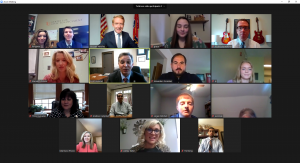GREENEVILLE – Tusculum University students and administrators built on the institution’s mission to inspire civic engagement within a caring Christian environment through a recent question-and-answer session with one of Tennessee’s top elected officials on the intersection of faith and government.

U.S. Sen. Marsha Blackburn, R-Tenn., bottom left, recently held a question-and-answer session with Tusculum University students and administrators.
U.S. Sen. Marsha Blackburn, a Republican, joined nine Tusculum students; Dr. Scott Hummel, Tusculum’s president; and Dr. Tricia Hunsader, the university’s provost and vice president of academic affairs, for the 30-minute discussion. During the event, the first-term senator answered questions posed by the students and Dr. Hummel.
One of the questions inquired how Blackburn intentionally incorporates her faith into her work and daily conversations.
“One of the things I do is pray my way through the day,” Blackburn said. “I take time to pray before a meeting, pray for an outcome and pray for God’s blessing to be felt in a certain situation. Those are wonderful ways to manifest and incorporate my faith in meetings and in speaking truth and gentleness during those gatherings.”
Blackburn’s faith and friendships help her handle the pressure of public office.
“I have a great circle of friends – close friends – who are always there for me and with me,” she said. “I have a wonderful family, and in public service, that is so important because your family, whether they like it or not, are going to be in the public eye. When you have those good, solid relationships and people you can confide in, that is very helpful. In our church, we have small group fellowships, and the small community that we are with within our church is a wonderful sounding board for me. There is a group of women I talk with, and they pray for me every Monday morning.”
People in the United States need to look to the Constitution for guidance on the possibility of a stronger connection between church and state, she said.
“The Constitution limits the interconnectivity between your church and your state,” Blackburn said. “But what I do support and where I think citizens should be mindful is looking at an individual public official or a candidate and determining what is their philosophy of life and what is their philosophy of government and how are they going to make decisions.”
Another question touched on the ability of elected officials to make the best decisions for America together when there are divisions between political parties.
“Politicians should put aside differences – stand on your principle but look for ways that you can agree,” Blackburn said. “If you’re going to disagree, do it in a respectful way. Our nation and our form of government, a democratic republic, have been well served by robust, respectful political debate. As Christians, that is what we should carry into the debate – seeking to understand, seeking to solve problems and issues – and arrive at a conclusion that is going to add to the quality of life of all citizens.”
On another subject, one student wondered how the Supreme Court could rule that it is unconstitutional for teachers to lead a class in prayer at a public school but to require them to teach a class about religions or curriculum that violates their religious consciences. She wondered how it could not be an infringement on a teacher’s personal religious beliefs.
Blackburn said she hears from teachers who raise a concern about curriculum requirements with which they disagree.
“Christians should not be forced to recite a Muslim prayer, and Muslims ought not to be forced to recite a Christian prayer,” she said. “At the same time, this nation is built on a Judeo-Christian ethic, and displaying the Ten Commandments and pausing and having a prayer for individuals who want to have that time of prayer, these are things that many school districts and school boards are reviewing.
“For example, they have that time for a flag-raising ceremony, where they honor the country and take that time for a prayer as a way to set the day. Or they take that time for a silent prayer so people of different faiths can pray silently during that moment set aside for silent prayer. We are going to continue to hear these conversations, and I think it is important that we look at them as choices and not as mandates.”
Students who participated and their majors are Grace Beddingfield, psychology; Andrew Campbell, history; Ben Gall, business administration; Trenton Gibson, sport management; Katlyn Jones, psychology; Ashley Keller, nursing; Avonlea Knode, business administration; Logan Mitchell, interdisciplinary studies K-5; and Meredith Wilson, who is seeking a Master of Arts in teaching.
Dr. Hummel appreciated the opportunity for him and the students to connect with Blackburn through this event.
“As a faith-based institution, we are proud of our Presbyterian heritage and the liberty for our students, as well as our faculty and staff members, to explore their faith,” Dr. Hummel said. “At the same time, we welcome students, faculty and staff who have a different or no faith system and treat them with just as much respect. We are grateful to Sen. Blackburn for sharing her faith story with us and helping our students know that they can embrace their faith and allow it to be part of their life journey.”
For more information about Blackburn, please visit https://www.blackburn.senate.gov/. To learn more about the university, please visit www.tusculum.edu.


